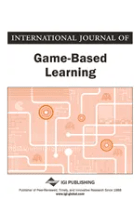
International Journal of Game-Based Learning
Scope & Guideline
Revolutionizing Education: Where Gaming Meets Learning
Introduction
Aims and Scopes
- Game-Based Learning Methodologies:
The journal emphasizes the development and implementation of various game-based learning methodologies, including serious games, gamification, and digital game-based learning, to enhance educational experiences. - Educational Outcomes and Assessment:
Research published in the journal often investigates the impact of game-based learning on educational outcomes, including cognitive, emotional, and social dimensions of learning, providing evidence-based assessments of effectiveness. - Interdisciplinary Approaches:
The journal encourages interdisciplinary research that combines insights from education, psychology, technology, and game design to inform the development and application of game-based learning. - Innovative Educational Tools:
It highlights innovative tools and technologies, such as mobile games, escape rooms, and immersive environments, that promote engagement and motivation among learners. - Targeted Learning Populations:
The journal addresses diverse learner populations, including pre-service teachers, students with intellectual disabilities, and employees in various industries, focusing on tailored game-based learning strategies.
Trending and Emerging
- Neurotechnology in Game-Based Learning:
Recent studies are increasingly utilizing neurotechnological approaches to analyze the cognitive effects of game-based learning, highlighting a trend towards understanding brain activity in educational contexts. - Hybrid Learning Environments:
The rise of hybrid learning environments, such as escape rooms and sandbox games, indicates a growing interest in collaborative and immersive educational experiences that blend physical and digital elements. - Mobile and Cross-Cultural Learning:
There is a notable trend towards mobile game-based learning and its application in cross-cultural contexts, addressing the need for adaptable educational tools in diverse learning environments. - Gamification and Personalization:
Research focusing on the personalization of gamification strategies to cater to different learner profiles is emerging, emphasizing the importance of tailored educational experiences. - Social and Emotional Learning through Games:
Increasingly, studies are exploring the role of games in promoting social and emotional learning, addressing how game mechanics can foster collaboration, empathy, and critical thinking among learners.
Declining or Waning
- Traditional Educational Methods:
There seems to be a declining interest in research that compares traditional educational methods with game-based learning, as more focus shifts towards innovative and hybrid approaches. - General Gamification Studies:
Research specifically focusing on general gamification without a strong educational context appears to be waning, with a trend towards more specific applications of gamification in particular subjects or contexts. - Historical Perspectives on Gaming in Education:
There is a noticeable decrease in papers that explore the historical context of gaming in education, suggesting a shift towards current applications and future-oriented research. - Standalone Educational Games:
The journal has seen fewer studies on standalone educational games without integration into broader pedagogical frameworks, indicating a movement towards integrated approaches that combine various elements of game-based learning.
Similar Journals

International Journal of Mobile Learning and Organisation
Pioneering Research in Mobile Learning and Organizational GrowthInternational Journal of Mobile Learning and Organisation, published by InderScience Enterprises Ltd, is a premier academic journal focused on the intersection of mobile technology and educational practices. With an ISSN of 1746-725X and an E-ISSN of 1746-7268, this journal has been a vital resource since its inception in 2007, exploring innovative approaches to mobile learning and organizational development with a converged publication timeline extending to 2024. The journal holds a respectable impact in various disciplines, categorized in Q3 for Computer Science Applications and Q2 for both Education and E-learning as of 2023, showcasing its relevance in critical academic discussions. Ranked in the 75th percentile for Educational Social Sciences and the 52nd percentile in Computer Science, it serves as a bridge for researchers, professionals, and students eager to advance their understanding and application of mobile learning techniques. Although it does not provide open access, the journal is recognized for its rigorous peer-review process, ensuring the publication of high-quality research that contributes to the landscape of educational technology.

Metacognition and Learning
Fostering Innovation in Education and Cognitive PsychologyMetacognition and Learning is a premier academic journal published by Springer, dedicated to advancing research in the fields of education and cognitive psychology. Since its inception in 2006, this journal has consistently maintained a prestigious position, achieving a Q1 ranking in Education for 2023, underscoring its influential role in the dissemination of innovative ideas and empirical findings. With an ISSN of 1556-1623 and E-ISSN of 1556-1631, it provides a vital platform for scholars to explore the intricate relationships between metacognitive processes and learning outcomes, thereby enriching pedagogical practices and educational strategies. Although it is not open access, the insights offered in its publications are invaluable for researchers, educators, and practitioners who seek to enhance learning and teaching through a deep understanding of metacognition. The journal is headquartered in New York, United States, at One New York Plaza, Suite 4600, where it continues to foster a vibrant community of learning enthusiasts and contribute significantly to the academic landscape through its robust editorial standards and diverse contributions.

Journal of Intelligence
Championing open access to groundbreaking insights.The Journal of Intelligence, published by MDPI, is a premier open access journal dedicated to advancing the understanding of intelligence in its multifaceted forms. Since its inception in 2013, this journal has made significant contributions to the fields of Cognitive Neuroscience, Developmental and Educational Psychology, and Experimental Psychology, consistently reflecting its growing impact within the academic community. Located in Switzerland, the journal benefits from a global reach and has been indexed in Scopus, achieving respectable ranks across various categories—highlighting its relevance and quality in Social Sciences and Psychology. With an impressive 2023 category quartile ranking of Q2 in Education and Q3 in other relevant fields, the journal is a valuable resource for researchers, professionals, and students seeking to explore theoretical and empirical aspects of intelligence. As an open access publication, the Journal of Intelligence not only promotes the free exchange of knowledge but also ensures that cutting-edge research is accessible to a wider audience, thus fostering innovation and collaboration in the quest to understand the nuances of human intelligence.
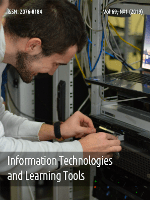
Information Technologies and Learning Tools
Empowering Education Through Innovative Technology.Information Technologies and Learning Tools is a pioneering scholarly journal dedicated to the exploration and dissemination of knowledge within the rapidly evolving field of educational technology. Published by the NATIONAL ACADEMY OF EDUCATIONAL SCIENCES OF UKRAINE, INSTITUTE OF DIGITALIZATION EDUCATION, this journal has maintained its Open Access policy since 2006, ensuring that groundbreaking research is readily available to educators, researchers, and practitioners worldwide. With the ISSN 2076-8184, the journal serves as a critical platform for innovative studies focusing on the integration of information technologies into educational practices, seeking to bridge gaps between digital tools and effective learning methodologies. Despite the absence of specific rankings, its commitment to advancing educational theories and applications positions it as an essential resource for professionals and students striving to enhance learning experiences through technology. As the educational landscape continues to transform, Information Technologies and Learning Tools stands at the forefront, fostering collaboration and knowledge sharing across diverse academic communities.
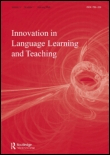
Innovation in Language Learning and Teaching
Bridging Theory and Practice in Language Education Innovation.Innovation in Language Learning and Teaching is a premier peer-reviewed journal published by Routledge Journals, Taylor & Francis Ltd, focusing on the intersection of innovative practices in language education and teaching methodologies. With a notable impact factor reflected in its recent placement in the Q1 quartile for both Education and Linguistics and Language categories, this journal serves as a crucial resource for scholars and practitioners aiming to enhance pedagogical approaches and improve learning outcomes in language education. Spanning from 2009 to 2024, it showcases cutting-edge research that addresses contemporary challenges in the field, facilitating a deeper understanding of language acquisition, pedagogy, and curriculum development. The journal is indexed in Scopus, demonstrating its significant contribution to the academic community, with impressive ranks in both the Arts and Humanities as well as the Social Sciences categories. Although it follows a traditional subscription model, the journal is committed to disseminating high-quality research that fosters collaboration and discussion among researchers, educators, and students dedicated to advancing language learning and teaching practices.
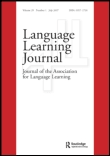
Language Learning Journal
Empowering educators through innovative research.Welcome to the Language Learning Journal, a premier resource for researchers, educators, and linguists alike, published by Routledge Journals, Taylor & Francis Ltd. With a proud history dating back to 1990 and commitment to advancing the exploration of language acquisition, this esteemed journal boasts an impressive impact factor within Q1 rankings across both the Education and Linguistics and Language categories. Ranked #40 in Language and Linguistics and achieving a 96th percentile in the Arts and Humanities, the journal serves as a crucial platform for disseminating cutting-edge research, innovative methodologies, and impactful discussions in the field of language learning. Although currently not offered as an open access publication, the depth and quality of content ensure significant contributions to the body of knowledge for professionals and scholars. With its global reach, the Language Learning Journal is dedicated to fostering the development and understanding of language learning processes, enabling readers to stay informed about the latest trends and findings through rigorous peer-reviewed articles.

Journal of Teaching and Learning
Fostering global conversations in education.The Journal of Teaching and Learning, published by the University of Windsor, Faculty of Education, is a prominent open-access journal in the field of education, dedicated to fostering scholarly discussion and exploration. Since its inception in 2001, it has served as a vital platform for researchers, educators, and practitioners to share innovative insights and evidence-based practices that advance teaching and learning methodologies. With an impact factor reflective of its category quartiles, it currently ranks in the Q3 category for education according to the 2023 evaluation, standing at 834 out of 1543 in Scopus's social sciences education rankings. This journal aims to bridge theoretical frameworks with practical applications, providing a robust resource for those invested in enhancing educational outcomes. With an open-access model, the Journal of Teaching and Learning ensures that its contributions are readily accessible to a global audience, encouraging the dissemination of knowledge and collaborative learning experiences. The journal is published in Canada and welcomes submissions that explore current trends and future directions in teaching practices, learner engagement, and educational policy.
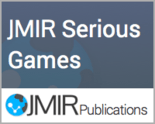
JMIR Serious Games
Unleashing the Power of Games for Better HealthJMIR Serious Games is a leading open-access journal published by JMIR PUBLICATIONS, INC, dedicated to disseminating high-quality research in the emerging field of serious games for health. Since its establishment in 2013, the journal has positioned itself at the forefront of innovative strategies using game technology to improve health outcomes, rehabilitation, and mental health treatment. With a commendable impact factor and a prestigious Q1 ranking in Biomedical Engineering, Physical Therapy, and Rehabilitation for 2023, JMIR Serious Games stands out as a crucial resource for professionals and researchers aiming to explore the intersection of gaming and health sciences. The journal fosters a collaborative environment that encourages the sharing of cutting-edge research findings and applications, making it an essential reference for academics, practitioners, and students interested in harnessing the potential of serious games to transform healthcare practices.

Revista Educacion en Ingenieria
Connecting Minds: Bridging Theory and Practice in Engineering EducationRevista Educación en Ingeniería is a distinguished academic journal dedicated to advancing research and discourse in the field of engineering education. Published by the Asociación Colombiana de Facultades de Ingeniería, this journal seeks to foster innovative teaching practices and facilitate the exchange of ideas among educators, researchers, and students within the engineering domain. With an ISSN of 1900-8260, it provides a platform for scholarly articles that explore pedagogical methodologies, curriculum development, and technological integration in engineering programs. Although the journal operates under a traditional access model, its commitment to high-quality research is reflected in its broad scope, which invites contributions from a diverse range of educational perspectives. The Revista Educación en Ingeniería plays a critical role in shaping the future of engineering education, ensuring that researchers and practitioners can stay informed about the latest developments and best practices in the field.
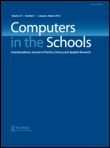
COMPUTERS IN THE SCHOOLS
Unleashing potential through technology-enhanced education.COMPUTERS IN THE SCHOOLS, published by ROUTLEDGE JOURNALS, TAYLOR & FRANCIS LTD, is a pivotal scholarly journal dedicated to exploring the intersection of technology and education. With an impressive publishing history dating back to 1984 and ongoing contributions until 2024, this journal provides a comprehensive platform for researchers and educators to disseminate innovative ideas and practices related to the use of computers in educational settings. Although the journal does not currently offer Open Access options, it maintains an esteemed position in the academic community, evidenced by its Q2 ranking across multiple categories including Computer Science, Education, and Library and Information Sciences in 2023. It is particularly valued for its rigorous peer-review process which ensures high-quality contributions. With its ISSN of 0738-0569, COMPUTERS IN THE SCHOOLS serves as an essential resource for advancing knowledge, fostering best practices, and influencing policy in the integration of technology into schools, making it indispensable for educators, researchers, and practitioners striving to enhance learning experiences through innovative technological approaches.